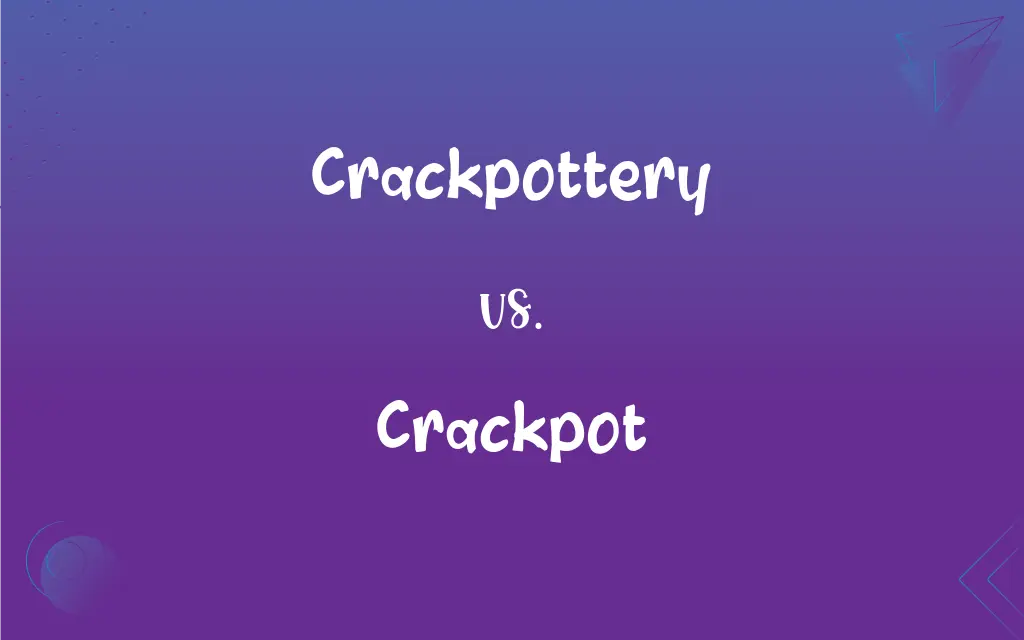Crackpottery vs. Crackpot: What's the Difference?
By Harlon Moss || Updated on May 29, 2024
Crackpottery refers to the ideas or theories proposed by someone considered a crackpot, while a crackpot is a person who holds or promotes eccentric or nonsensical beliefs.

Key Differences
Crackpottery refers to the eccentric, implausible, or nonsensical ideas and theories promoted by someone. These ideas are often seen as lacking scientific merit or rational basis. Crackpottery can include conspiracy theories, pseudoscientific claims, and other unfounded beliefs. On the other hand, a crackpot is the person who believes in or advocates for these unconventional or irrational ideas. This term is used pejoratively to describe individuals who are perceived as deluded or irrational due to their adherence to such ideas.
Crackpottery can be characterized by the persistence of ideas that have been widely debunked or rejected by the scientific community. These ideas often lack empirical evidence and are driven by personal belief rather than objective analysis. In contrast, a crackpot is someone who not only believes in these ideas but also actively promotes them, often disregarding criticism and opposing viewpoints.
The term crackpottery often implies a body of work or a collection of ideas, whereas crackpot focuses on the individual. For example, a person might be labeled a crackpot for advocating a theory that defies basic scientific principles, and their collection of theories and ideas would be referred to as crackpottery.
Crackpottery can appear in various fields, including science, medicine, and history, where individuals propose unconventional theories that lack credible evidence. A crackpot might be someone who spends significant effort trying to convince others of their fringe beliefs, despite overwhelming evidence to the contrary.
Crackpottery is often marked by a disregard for established facts and an emphasis on subjective interpretations. Crackpots typically exhibit a strong conviction in their ideas, often coupled with a dismissive attitude towards mainstream perspectives.
ADVERTISEMENT
Comparison Chart
Definition
Eccentric, implausible, or nonsensical ideas
A person who promotes eccentric or irrational beliefs
Context
Refers to theories and ideas
Refers to the individual
Usage
Describes a body of work or collection of beliefs
Describes a person
Evidence
Lacks empirical support and scientific merit
Believes in and advocates unsupported theories
Perception
Viewed as irrational or implausible
Seen as deluded or irrational
ADVERTISEMENT
Crackpottery and Crackpot Definitions
Crackpottery
Nonsensical theories often debunked by experts.
Flat Earth theory is a classic example of crackpottery.
Crackpot
A person who promotes eccentric or irrational ideas.
Many considered him a crackpot for his belief in time travel.
Crackpottery
Pseudoscientific claims with no empirical basis.
The website was full of crackpottery about miracle cures.
Crackpot
Someone with deluded or implausible beliefs.
The crackpot insisted that he could communicate with extraterrestrials.
Crackpottery
Implausible beliefs not accepted by the scientific community.
His book was filled with crackpottery about ancient aliens.
Crackpot
A proponent of unfounded conspiracy theories.
She was labeled a crackpot for arguing that lizard people run the government.
Crackpottery
Eccentric or implausible ideas lacking scientific support.
The professor dismissed the perpetual motion machine as pure crackpottery.
Crackpot
A person who rejects mainstream science in favor of fringe beliefs.
Despite evidence, the crackpot continued to deny climate change.
Crackpottery
Unfounded conspiracy theories.
The notion that the moon landing was faked is crackpottery.
Crackpot
An eccentric person, especially one with bizarre ideas.
Crackpottery
The behaviour of a crackpot; madness.
Crackpot
Foolish; harebrained
A crackpot notion.
Crackpot
(informal) An eccentric, crazy or foolish person.
Time will tell whether he is a crackpot or a genius for promoting that sort of idea.
Crackpot
(informal) Someone addicted to crack cocaine (i.e. a drug addict).
Crackpot
(informal) Eccentric or impractical.
A crackpot idea
Crackpot
A whimsically eccentric person.
Crackpot
A whimsically eccentric person
Crackpot
An individual advocating pseudoscientific theories.
The town crackpot claimed he had invented a device to control the weather.
FAQs
What is crackpottery?
Crackpottery refers to eccentric, implausible, or nonsensical ideas that lack scientific merit.
Is crackpottery based on scientific evidence?
No, crackpottery typically lacks empirical evidence and scientific support.
Can crackpottery include conspiracy theories?
Yes, crackpottery often includes unfounded conspiracy theories.
What kind of ideas does a crackpot promote?
A crackpot promotes ideas that are considered eccentric, implausible, or irrational.
Can a crackpot ever be taken seriously?
Typically, a crackpot is not taken seriously due to their promotion of irrational beliefs.
Are all unconventional ideas considered crackpottery?
Not all unconventional ideas are crackpottery; only those lacking evidence and plausibility are labeled as such.
What distinguishes crackpottery from legitimate scientific theories?
Crackpottery lacks empirical support and is often based on personal belief rather than objective analysis.
Is crackpot a pejorative term?
Yes, crackpot is a pejorative term used to describe someone perceived as deluded or irrational.
How can you identify crackpottery?
Crackpottery can often be identified by its lack of empirical evidence, rejection of established facts, and reliance on personal belief.
Who is a crackpot?
A crackpot is a person who believes in or promotes eccentric or irrational ideas.
Can crackpottery be harmful?
Yes, crackpottery can be harmful if it leads people to make decisions based on false or misleading information.
How is crackpottery viewed by the scientific community?
Crackpottery is generally dismissed by the scientific community due to its lack of evidence and plausibility.
Do crackpots ever acknowledge their ideas are implausible?
Typically, crackpots are very convinced of their ideas and dismiss criticism and opposing viewpoints.
Can crackpottery be entertaining?
While often irrational, crackpottery can sometimes be entertaining due to its imaginative and unconventional nature.
What motivates a crackpot?
Crackpots are often motivated by a strong conviction in their beliefs, despite evidence to the contrary.
What impact does crackpottery have on public discourse?
Crackpottery can skew public discourse by spreading misinformation and diverting attention from credible information.
Is crackpottery ever proven correct?
It is extremely rare for ideas labeled as crackpottery to be proven correct, as they typically lack a scientific basis.
Do crackpots collaborate with mainstream scientists?
Crackpots usually do not collaborate with mainstream scientists due to their rejection of accepted scientific principles.
How does society generally treat crackpots?
Society generally views crackpots with skepticism and often dismisses their ideas as irrational.
What fields can crackpottery appear in?
Crackpottery can appear in fields like science, medicine, history, and beyond.
About Author
Written by
Harlon MossHarlon is a seasoned quality moderator and accomplished content writer for Difference Wiki. An alumnus of the prestigious University of California, he earned his degree in Computer Science. Leveraging his academic background, Harlon brings a meticulous and informed perspective to his work, ensuring content accuracy and excellence.































































